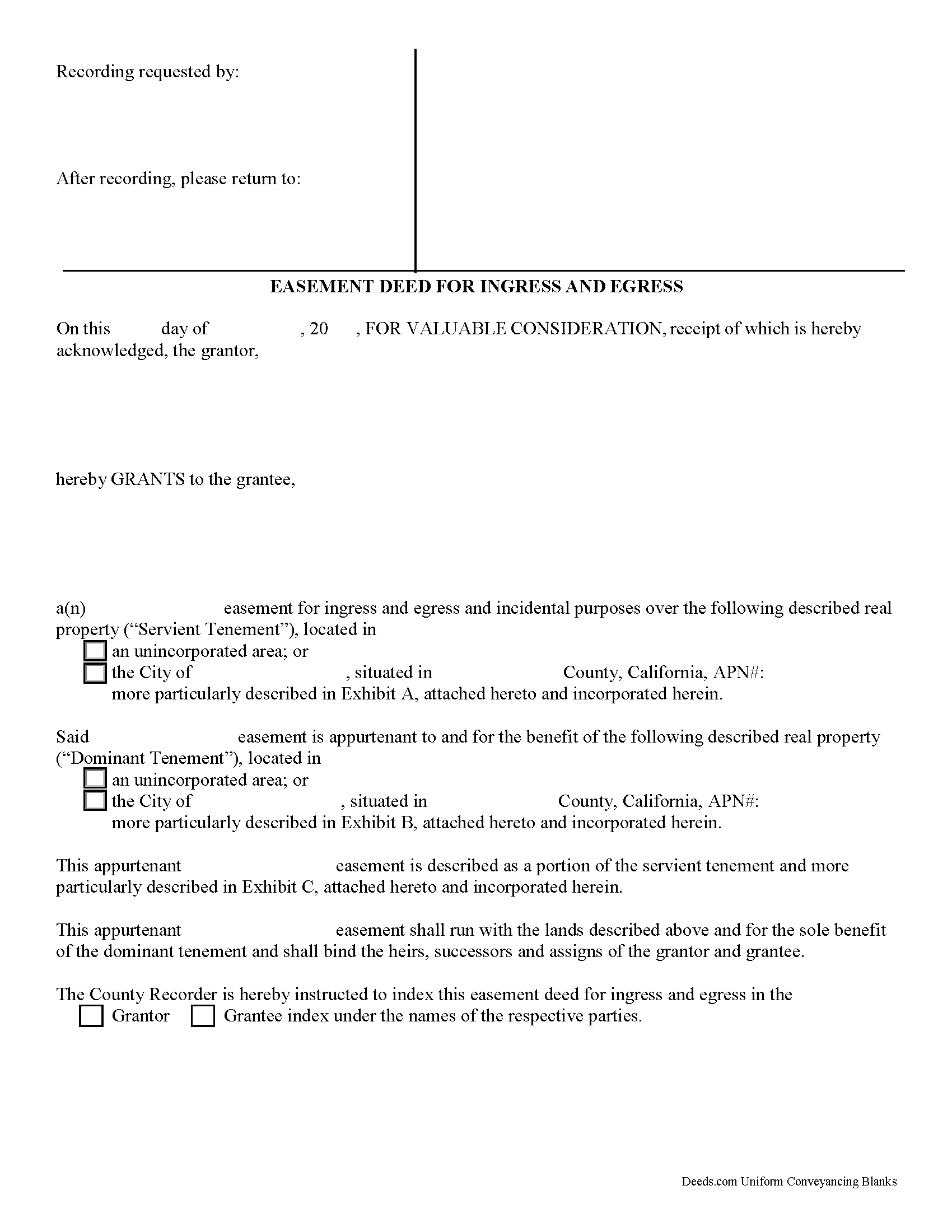California Easement Deed
County Forms
Where is the property located?
Alameda CountyAlpine CountyAmador CountyButte CountyCalaveras CountyColusa CountyContra Costa CountyDel Norte CountyEl Dorado CountyFresno CountyGlenn CountyHumboldt CountyImperial CountyInyo CountyKern CountyKings CountyLake CountyLassen CountyLos Angeles CountyMadera CountyMarin CountyMariposa CountyMendocino CountyMerced CountyModoc CountyMono CountyMonterey CountyNapa CountyNevada CountyOrange CountyPlacer CountyPlumas CountyRiverside CountySacramento CountySan Benito CountySan Bernardino CountySan Diego CountySan Francisco CountySan Joaquin CountySan Luis Obispo CountySan Mateo CountySanta Barbara CountySanta Clara CountySanta Cruz CountyShasta CountySierra CountySiskiyou CountySolano CountySonoma CountyStanislaus CountySutter CountyTehama CountyTrinity CountyTulare CountyTuolumne CountyVentura CountyYolo CountyYuba CountyEasement Deed for Real Estate Located in California

An easement is a non-possessory interest in another person's property that gives someone the right to use another person's property for a specific purpose. An easement can be acquired in many different ways: by an express grant, by prescription, by necessity, by implication, and by condemnation. Easements can be conveyed by deed, will, or contracts.
A transfer of real property in California will pass all the easements attached to the property and creates in favor thereof an easement to use other real property of the person whose estate is transferred in the same manner and to the same extent as such property was obviously and permanently used by the person whose estate is transferred, for the benefit thereof, at the time when the transfer was agreed upon or completed (CIV 1104).
Section 801 of the Civil Code of the California laws lists a number of land burdens, or servitudes upon land, which may be attached to other land as incidents or appurtenances as easements. A servitude (the land upon which a burden or servitude is laid) can only be created by someone who has a vested interest in the servient estate (CIV 804). Additionally, a conservation easement can be created for the purposes of preserving the natural, scenic, historical, or open-space condition of a specific piece of land (CIV 815.1).
The party granting the easement must sign the easement deed and have his or her signature acknowledged before submitting the document to the county recorder. A California all-purpose acknowledgement is required (CIV 1188). The officer taking acknowledgements must have a certificate endorsed on or attached to the easement.
As interests in real property, easement deeds are subject to the recording laws in California and are entitled to be recorded in the office of the county clerk in the county where the property is located (CIV 1169). Once an easement deed has been recorded, it serves as constructive notice of the contents to subsequent purchasers and mortgagees (CIV 1213). Every conveyance of real property is void as against any subsequent purchaser or mortgagee of the same real property, or part thereof, in good faith and for a valuable consideration, whose conveyance is first duly recorded, and as against any judgment affecting the title, unless the conveyance shall have been duly recorded prior to the record of notice of action (CIV 1214). An unrecorded easement deed is valid as between the parties to it and those who have notice of it (CIV 1217).
(California Easement Deed Package includes form, guidelines, and completed example)